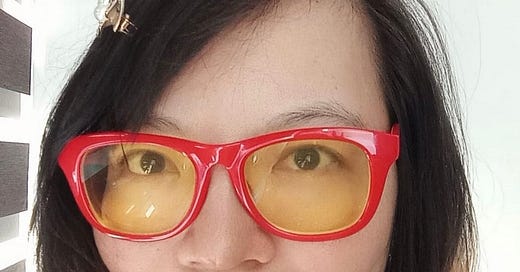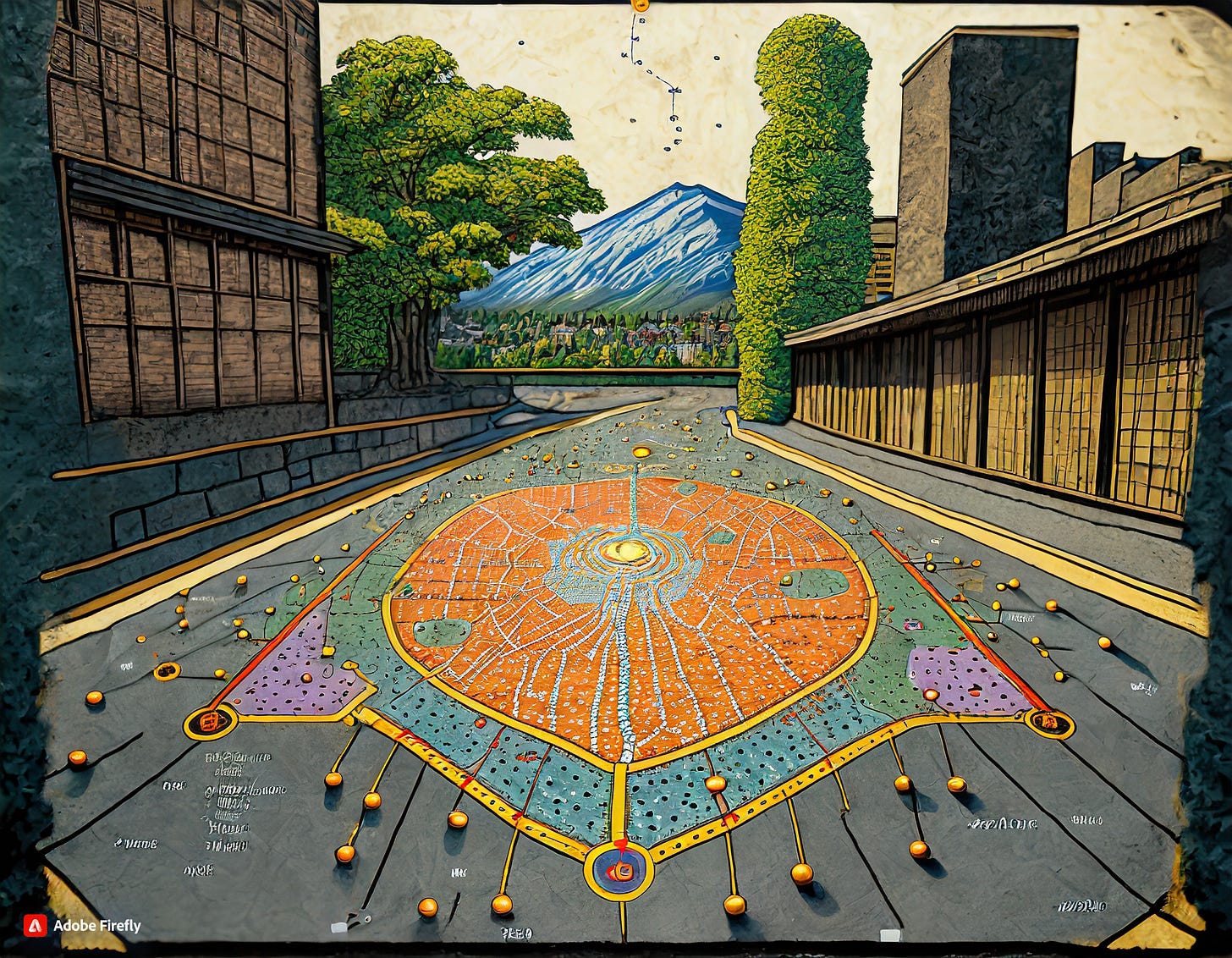For a couple of months I’ve been wanting to share some conversations I’ve had with Jade Fang, who’s the President of the Board of our scrappy little acupuncture school, POCA Tech. In my experience, sanity is a cooperative project — especially in the acupuncture profession — and Jade is one of the people who keeps me sane. (For a previous conversation with her about complex PTSD, see this post). I’m hoping to spread some of that sanity around.
As I was looking over my notes, I realized that one of the themes of our conversations is the legitimization of acupuncture. Which is obviously related to the acupuncture profession’s dimming prospects for survival. Jade’s perspective on legitimacy — and how it differs from the acupuncture profession’s approach — is what I want to dig into here.
Me: First, though, can you remind me what year we met?
Jade: 2009. The story is, I was in Shanghai finishing up my acupuncture internship and I was trying to figure out how I was going to practice after I graduated. My parents are Chinese acupuncturists and work 90 hours a week. They have a successful clinic, but I knew I didn’t want to do what they do. And I knew that most acupuncturists weren’t making a living.
Then I found your articles in Acupuncture Today. I joined CAN (the Community Acupuncture Network, POCA’s predecessor organization) and got on the forums. My first post there was like everybody else’s: I don’t know what to do! And everybody weighed in with support and advice. I was 26 and that kind of guidance was exactly what I needed.
I was about to open a clinic during a recession in a tiny Minnesota town where I didn’t know anybody. I knew the failure rate for acupuncture practices was really high. I looked online and talked to other community clinics, and then right before I opened my clinic you did the CAN 101 workshop in Minneapolis in September 2009. I had had my clinic open for only a couple of months at this point so the timing was perfect.
Me: It seems like you never had any illusions about the business side of practicing acupuncture. Like, zero. Which is unusual for acupuncturists.
Jade: I grew up working in my parents’ clinic. My father had just gone through acupuncture school himself, so I was there for the part where his classmates were calling my mom and saying could I work at your clinic, and she was saying no. We would sit around our kitchen table and talk about how people aren’t making it as acupuncturists, no matter how well they did in school. Because it’s not about their clinical skills, or their academic abilities, it’s about running a business.
We were kind of the informal Asian Acupuncturist Employment Network in our community, for people who had maybe a one year visa and needed to figure out how they were going to work — and for those people we knew shouldn’t try to run their own business, they just needed to be employees somewhere! We tried to help them when we could. My dad had both Asian and Caucasian classmates and he worried about them making a living too. My mom was better at running a business — and my dad was still picking up business skills so we could see a marked difference in their work. And of course my parents worried about me running my own business. They never worried about my technique or my clinical skills, we knew that wasn’t the problem.
Me: So you came to community acupuncture with perspective and context that a lot of people don’t have.
Jade: Yes. When I learned about the community acupuncture model, my reaction was, this could work. I knew that acupuncture was unaffordable to most people. And I knew I didn’t want to work 90 hours a week and spend 4 years in the red to enact the other model. Community acupuncturists advised me to keep everything really simple and I was like, great! I found a space with inexpensive rent; the initial investment was $500 per month and the landlord painted it for me. I started out with zero gravity chairs I bought at Home Depot and a shelf from Walmart. I scavenged everything I could, I cobbled together everything my clinic needed…and it went fine. Over time I upgraded my chairs, lol.
Me: In the POCA Tech program, we focus on teaching students about reaching out to other community organizations, working with volunteers, and how to set up a nonprofit, which is something that most acupuncture schools don’t do. I want to be transparent, especially with students, that a lot of what I know in this area came directly or indirectly from you. I didn’t have any kind of formal background in governance and it was intimidating. It took a long time for me to have confidence with those bureaucratic skills — and a lot of it came from working on projects with you over the years. So tell me how you got so clear and competent about organizing? That’s not a common skill set among acupuncturists.
Jade: I joined the board of my local food co-op, and the timing lined up — there was a conference about co-op governance happening right at that time and they sent me. I didn’t understand what a board member did and I wanted to learn, so I went to all the workshops. I felt like I had no idea what I was doing — and then I realized that nobody else did either. Governance is about running the co-op’s business. My perspective was, I have opinions about running a business and I don’t want to overstep or mess things up, and I want to do a good job for this little co-op. It’s a pretty great thing and I’m invested! So I wanted to understand, how do you make a good board?
I don’t love bureaucracy but I’m always curious, how do you build something to do what you want it to do? I want the things I love to succeed.
And right around the time that you were starting up POCA Tech, I happened to be helping my own acupuncture school put together a DAOM program. So I had some context and understanding for the educational bureaucracy. That program was something I was working on mostly alone, so I was excited to work with other people on POCA Tech and I joined the Board. I’m always interested in, how do we get something to run well? We all have experience with organizations that run badly, so what’s the difference and what can we do?
Me: We’ve had a huge amount of trial and error with POCA Tech as you know. We’ve learned that we have to start talking about small business and mindset on the very first day of the program — and then never stop. We want students to feel empowered and we also want to be honest about the challenges they’re up against. Like you said, the acupuncture itself is the easy part. What I really hope is that students will come to think about these topics the way you think about them (and the way you’ve helped me think about them). No illusions, but also not afraid.
Awhile back we made an online CEU about building community partnerships, and I thought the intro video you did was really great. And as I re-watched it while I was working on this post, I realized: what you’re addressing here is how to legitimize acupuncture in your community, and the grassroots strategies you used to do that.
And then it reminded me of another video you made, that I’m not going to post here even though it’s hilarious, where you dramatized a conversation you had with a self-described “authority” in the acupuncture world. You were representing POCA Tech at an industry gathering and this person cornered you and fired all these questions at you, basically a public interrogation. Things like, how long is this so-called program of yours and do you even have a curriculum?
Jade: That was before COVID so it was in person — and it happened in front of a lot of people — so yeah, it was super awkward.
Me: They also asked, how do you attract patients to community acupuncture, do you even read lab tests or do any Western assessments, and how can you possibly retain patients?!? At the time you were treating 200 patients a week by yourself so I thought it was pretty funny. Anyway, recently I was at an industry gathering where the very same authority in the acupuncture world gave a presentation in which they said, the first thing you need to do when you get a new patient in your school clinic is to request their medical records because that makes you look legitimate and it justifies the fees you charge.
And I was like, aha! Most of the tension between community acupuncturists and the “authorities” comes from disagreeing about how to legitimize acupuncture in US society. And there’s more than one way! You’ve always been clear that legitimacy comes from: 1, relationships in the community and 2, good organization.
That kind of legitimacy is available to anyone, including people who don’t have much money. You don’t need a doctorate and a fancy office.
Now that we’re talking openly about the acupocalypse, I think organizing skills plus a community-oriented perspective are more important than ever, not just for POCA Tech students but for everyone. The acupuncture profession has isolated itself. We desperately need to make friends. We also need to pay attention to the nuts and bolts of our infrastructure at a level that acupuncturists have historically been unwilling to do. Continuing to focus on titles and turf warfare and just yelling in general, is not going to cut it.
Jade: Because of my experience with organizations I have more understanding about how most nonprofits are held together with duct tape — but there are ways to reinforce them with better duct tape. And because we’re keeping POCA Tech together with duct tape there’s not a lot of room for extras, just the basics.
I feel like it’s always important to ground whatever we’re talking about in business realities. When discussions get too amorphous it can be damaging. There’s a lot of that in the acupuncture profession — too many abstract discussions. I don’t want to just talk about things, I want to do things. I don’t want to just make comments on social media. I’m very concrete and I love the concreteness of POCA Tech.
Everything is hard enough, why would we make things harder for ourselves? We can get so much more done at POCA Tech because we’re not caught up in all the theories and all the mystery. We focus on the practicalities.





